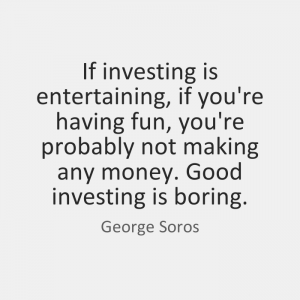
If you find investing “fun”, you’re probably taking bigger risks than you should.
The investing you see in TV and movies—constantly buying and selling stocks, watching the market every day, and so on—may be sexy, but the best way to make money, especially for normal folks, is to buy a few good funds and (mostly) leave them alone for many years. It may not be exciting, but unless you’ve devoted your life and career to the stock market, it’s the best way to grow your wealth over time.
Successful Investing is Beautifully Boring.
Hedge fund guru, George Soros sums it up brilliantly: “If investing is entertaining, if you’re having fun, you’re probably not making any money. Good investing is boring.”
Sure, we have all heard of a stock market success story or two. You probably have an acquaintance who made a decent return from investing in a tech stock that tripled in price before selling. Maybe even someone who inadvertently timed the 2008-09 crash correctly. In most cases, these successes are short-lived and can be attributed to pure luck. Although these ‘successful investing’ stories make for good dinner-party conversation, they are by far the exception among prosperous independent investors.
The fact is investors who produce the flashiest returns, time and time again, usually do so in the most unglamorous manner. A great example is Warren Buffett, who built an empire investing in so-called ‘boring’ stocks.
So when it comes to being a successful investor, boring is beautiful.
Keep it simple
When creating your portfolio, don’t load up on high-risk, exciting tech stocks, or try the latest, flavour-of-the-month strategies. Leave your emotions at the door and stick to the basics of analysing a potential investment based on the company’s balance sheet, competitive position, and valuations. When the numbers tell you to buy, then do it.
No need to fiddle with your investments
Frequent trading is an expensive practice. With every trade you make, you have to pay expensive fees and taxes. How do you avoid paying these fees? By investing in stocks and leaving them to appreciate in value over many years.
Without paying fees, your gains will be higher. Reinvesting those gains will deliver an even better return rate due to the positive effects of compounding interest.
Avoid mistiming the markets
Setting up a portfolio and forgetting about it will keep you from unwittingly timing the market.
People are emotional creatures. We love stories that tug at our heartstrings. Sensationalism sells and the media takes full advantage of it. When we read shocking headlines, it fuels our desire to make impulsive decisions. But never allow your emotions to get the better of you.
In a stock market drawback, your gut feeling may be telling you to sell your investments before losing yet another chunk of cash. But in reality, this volatility is usually short-lived and very often the shares will rally back to their previous position. There is no need to sell your investments during volatile times.
Holding your position in the market is far more beneficial than exiting the market. If you continue contributing to your portfolio, even when the market is down, you will be buying shares at a lower price. And when the market recovers to its previous level, you will be cashing in the chips.
Not everything in life is exciting. The less time you spend trying to make investing glamorous, the more time you have to enjoy the things that are meant to be exciting! So sit back, relax and let the market do the hard work for you.

